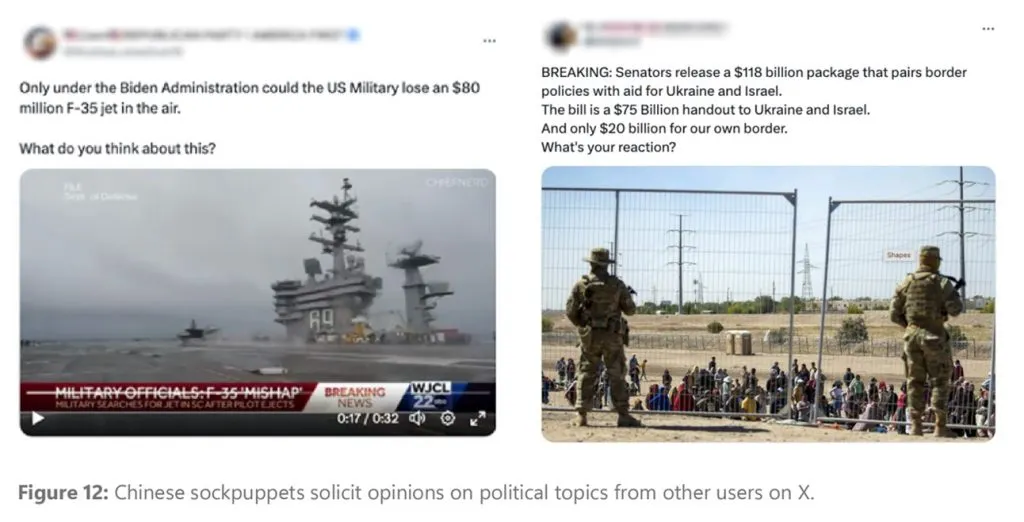China Is Escalating AI Use in Efforts to Influence US Elections, Microsoft Warns
2024-04-05 18:23:55

7x24 Newsflash
02:31 2025-07-11
Trump is expected to achieve his first major legislative victory on cryptocurrency policy next weekMr. Trump is poised for his first major legislative victory on cryptocurrency policy next week as House Republicans prepare to pass a bill previously introduced in the Senate establishing new regulations for stablecoins.
The U.S. House of Representatives is expected to introduce the Senate bill early next week.
02:25 2025-07-11
Strategy Bitcoin holdings are currently trading above $27 billionStrategy currently holds 597,325 bitcoins, with a total purchase cost of about $42.40 billion, and an average price of about $70,982 per bitcoin. According to market data, BTC is now quoted at $116,291. Based on this calculation, Strategy's bitcoin holdings are currently trading at about $27.064 billion.
02:19 2025-07-11
A whale deposited 7 million USDC into Hyperliquid and shorted PUMP with 3x leverage.According to Onchain Lens, in the past 22 hours, a whale deposited 7 million USDC into Hyperliquid and opened a short position in PUMP with 3x leverage.
02:19 2025-07-11
Binance Alpha has launched APENFT (NFT)According to the official website, Binance Alpha has launched APENFT (NFT).
02:19 2025-07-11
Kinto Lianchuang: The attack caused about $1.55 million in losses, and has contacted relevant departments to track down the stolen fundsRamon Recuero, co-founder of Arbiturm ecosystem modular trading platform Kinto, said in a post on the attack incident that yesterday hackers took advantage of the vulnerability of minting unlimited K tokens on Arbiturm, minted 110,000 K and started the attack to deplete Morpho Vault and Uniswap v4 pools. The final loss is about $1.55 million ETH and USDC, and caused the price of K tokens to fluctuate.
At present, the Kinto team has contacted the relevant departments to track down the stolen fund...
01:54 2025-07-11
BTC breaks through $116,000The market shows that BTC has broken through $116,000 and is now quoted at $116,000.33, with a 24-hour increase of 4.35%. The market is volatile, so please do a good job in risk control.
01:51 2025-07-11
Tornado Cash may request an adjournment of trial due to witness disputeAccording to CryptoSlate, the team of lawyers for Tornado Cash co-founder Roman Storm may request a brief adjournment of the trial as prosecutors plan to call as a witness a hacker who allegedly used the cryptocurrency mixing protocol.
Storm's defense team has filed papers in the U.S. District Court for the Southern District of New York seeking the exclusion of the unnamed witness on the grounds that the prosecution did not disclose the witness's information until after an agreed deadline. The d...
01:48 2025-07-11
Bitcoin has risen in recent days, and Hong Kong cryptocurrency concept stocks and ETFs have risen across the boardOn July 11, according to market conditions, as Bitcoin set new records in recent days, Hong Kong cryptocurrency concept stocks and ETFs collectively soared, Boya Interactive rose by more than 10%, Guotai Junan International, Blue Port Interactive, and Ouke Cloud Chain rose by more than 5%; Huaxia Ethereum, Harvest Ethereum, and FA Southern Ethereum rose by more than 5%, Huaxia Bitcoin, Boshi Bitcoin, FA Southern Bitcoin, and FA Samsung Bitcoin rose by about 4%.
01:39 2025-07-11
"ETH Edition Microstrategy" SharplinkGaming increases its holdings of 12,648 ETH againAccording to Ember, Sharplink Gaming, the "ETH version of micro-strategy", added another 12,648 ETH worth $35.31 million 5 hours ago. The company currently holds more than 222,000 ETH, with an average buy price of $2,617.
01:30 2025-07-11
Rova announces Bullpost incentive program to reward users for posting positive tweets about start-up companies and foundersAccording to the official announcement, Rova announced the launch of an incentive program called Bullpost, which will last for 6 weeks and reward users for posting positive comments about start-up companies and founders. The total prize pool of the Bullpost campaign is over $15,000, and users can improve their Bullpost score by posting original positive tweets, amplifying high-quality Bullpost content, and using specific hashtags.
It is reported that Rova is an ICM (Incentive Capital Markets) la...
01:27 2025-07-11
FTX/Alameda release 189,851 SOL tokens, approximately 30.94 million USDAccording to Lookonchain, an hour ago, FTX/Alameda released 189,851 SOL tokens, worth about $30.94 million.
01:09 2025-07-11
The TRUMP team linked the wallet to deposit more than 720,000 TRUMPs to Coinbase, which is about $7.03 millionAccording to Onchain Lens, a wallet associated with the TRUMP team deposited 722,010 TRUMPs worth $7.03 million to Coinbase.
Hot News
Cryptocurrency Payback Calculator - InstructionsVitalik: "DAO" means "project", "official" means "scam"Backpack Exchange已面向英国用户开放其服务派盾:NIBI同名代币发生Rug Pull,损失约31.39万美元香港金管局推出稳定币发行人沙盒CIAN与Lido合作,在Base上推出wstETH Hyper-Staking VaultGate.io 3月储备金总额突破60亿美元,额外储备金超8亿美元Polyhedra Network已于3月12日16时完成ZK空投快照英FCA:不会反对加密资产相关ETN上市请求BTC流通市值突破1.4万亿美元,续创新高Space Nation将于3月底启动OIK代币空投
Related Recommendations
Cryptocurrency Payback Calculator - InstructionsBackpack Exchange已面向英国用户开放其服务派盾:NIBI同名代币发生Rug Pull,损失约31.39万美元香港金管局推出稳定币发行人沙盒CIAN与Lido合作,在Base上推出wstETH Hyper-Staking VaultGate.io 3月储备金总额突破60亿美元,额外储备金超8亿美元Polyhedra Network已于3月12日16时完成ZK空投快照英FCA:不会反对加密资产相关ETN上市请求BTC流通市值突破1.4万亿美元,续创新高Space Nation将于3月底启动OIK代币空投